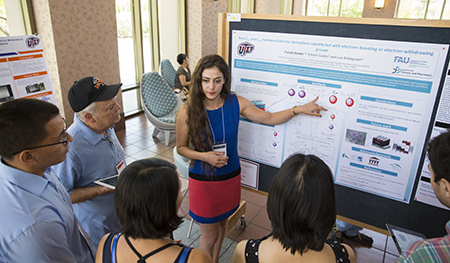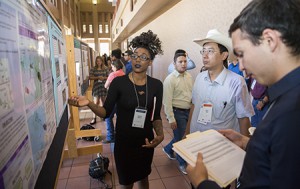Originally published Aug. 26, 2016
By Lauren Macias-Cervantes
UTEP Communications
More than 130 undergraduate students had the opportunity to present their research at the 2016 Summer COURI Symposium in August. The Campus Office of Undergraduate Research Initiatives (COURI) provides the opportunity to undergraduates twice a year and includes disciplines as diverse as engineering, science, the arts and the humanities.
Organizers say the experience is invaluable.
“I can guarantee you that the majority of faculty members at UTEP did not have this opportunity as undergraduates,” said COURI Director Lourdes Echegoyen, Ph.D. “I conducted undergraduate research but I didn’t have the opportunity to present, and as a consequence I was terrified the first time I had to do it in graduate school.”
The symposium featured rows of students with their posters ready to present to judges and members of the public.

Each student researcher was paired with a professor for mentorship and was judged on presentation elements and the impact their research will have on their respective disciplines and future work.
English student Carmen Ordaz researched paratextual verse in early modern English texts.
“At first I was kind of nervous, especially being the only one from the English department presenting, but I realized that every research, every work has the same value,” Ordaz said. “Each one has a different purpose and all want to come out with good outcomes.”
Ordaz received top honors in the creative arts and humanities category and will now encourage others in her field to participate.
“It really motivates me to try and get others to try and branch out,” she said.
Echegoyen said the presentation platform is great preparation for graduate school and students’ professional careers.
“Good communication skills are something employers are looking for because the fast pace of technology is constantly changing the job market,” Echegoyen said. “This means the jobs that students will apply for upon graduation may not exist today. However, certain transferrable skills will always be needed – communication is one of them.”
In addition, the summer session of the symposium provided external networking opportunities as undergraduates from other universities, who came to UTEP to conduct research during the summer, also participated. The summer symposium featured 36 visiting students from 17 different colleges and universities, ranging from El Paso Community College to Penn State to schools in Puerto Rico and China.
“It is great for them (visiting students) because they get to interact with our faculty and staff, get a glimpse of our campus and experience all that El Paso (and UTEP) have to offer while they are here,” explained COURI Assistant Director Karina Canaba. “It is a great recruiting tool and a chance for us to show these students all the great things that are available to them here. It is also beneficial for our UTEP students because they get to interact with people from different backgrounds and experiences and potentially learn different techniques that they can use in their work,” she said.
Research projects at the sessions covered multiple disciplines, representing the variety of research being performed across UTEP colleges. Topics included seizure detection, soil analysis, 3-D printing, drug effects, bioinformatics, chemistry, solar energy, mosquito surveillance and Alzheimer’s disease.
Wesleyan University neuroscience major Carli Poisson received the ‘Best Poster Presentation’ Award in the physical and natural sciences category. She came to conduct research at UTEP for the summer as part of the SMART-MIND program, funded by the National Institute on Drug Abuse (NIDA). Her project on drug abuse and obesity looked at the use of Docosahexaenoic acid – a polyunsaturated omega-3 fatty acid found throughout the body – as a therapeutic to reverse high-fat diet-induced obesity, insulin resistance, and dopamine system dysfunction.

“I’ve always been really interested in both drug addiction and food addiction and how they are similar … and the different pathways between them and how we tease them apart,” Poisson said.
Though the study’s results weren’t what she expected, Poisson said the research was an invaluable opportunity for her.
“To come to an institution where they value the research you do, but also the people who come here and your background and everything you stand for, is a really good opportunity and a great way to start in academia or other STEM fields,” Poisson said.
Mariana Castaneda, an engineering student, presented for the second time at the symposium and placed first in the applied sciences category. Her research was a feasibility study of thermal energy harvesting using lead-free pyroelectrics. Pyroelectricity is the ability of certain materials to generate energy when they are heated or cooled.
“It feels very rewarding to have something like this where you can present you research, especially as an undergrad and even more so, as I am one of the only women in research in the mechanical engineering department,” Castaneda said. “It’s pretty special to be here and have especially Dr. (Yirong) Lin as my mentor.”
The 2016 COURI Summer Symposium also included keynote speaker Lydia Villa-Komaroff, Ph.D., a renowned scientist and science administrator who has held positions at MIT, Harvard University and the University of Massachusetts Medical School, and who has been a leader in advocating for the advancement of women and minorities in science.
COURI’s spring symposium is scheduled for April 2017.
COURI Summer Symposium Winners
Physical & Natural Sciences
Honorable Mention
Alexander Madej
Mentor: Dr. James Salvador
Emily Park
Mentor: Dr. Kyung-An Han
Best Poster Presentation
Carli Poisson
Mentor: Dr. Katherine Serafine
Applied Sciences
Honorable Mention
Matthew R. Mena
Mentor: Dr. Juan Noveron
Best Poster Presentation
Mariana Castaneda
Mentor: Dr. Yirong Lin
Social Sciences
Honorable Mention
Joanna Velasco
Mentor: Dr. Celia Pechak
Best Poster Presentation
Carlos Portillo
Mentor: Dr. Craig A. Field
Creative Arts & Humanities
Best Poster Presentation
Carmen M. Ordaz
Mentor: Dr. Andrew J. Fleck
Mentoring Award
Craig A. Field, Ph.D.
Psychology – BUILD Program